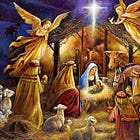Is December 25th the Correct Date for Christmas?
The Traditional Answer Is Probably the Best
Every year the debate begins again. But Craig Bergman explains why December 25th actually is the best date:
“When was Jesus Born? September? December? There are valid points for Both. WHEN is not as important as WHY!
“But here is the argument that prevailed when the Holy Days were set, the one that has been followed by the Catholic and Protestant faith for nearly 2000 years.
“And NO December 25 was NOT because of the pagan Saturnalia. That was December 6th. This date is because Great Wise Christ Honoring Men wanted to SET a date and settle minor disputes so that we could celebrate as ONE Church body.
“Merry Christ's Mass to one and all.”
UPDATE: Not shockingly, some readers have asked if the Annunciation was in fact reverse-engineered from the December 25 date for Christmas. But the answer is a resounding no. As Augustine attests in On the Trinity, the early church fathers universally believed that Christ was conceived on the same day as His death. So they fixed the date of the Annunciation to that.
For He is believed to have been conceived on the 25th of March, upon which day also He suffered; so the womb of the Virgin, in which He was conceived, where no one of mortals was begotten, corresponds to the new grave in which He was buried, wherein was never man laid, neither before nor since. But He was born, according to tradition, upon December the 25th.
Interestingly enough, March 25 was full of symbolism for the early church, which also believed that it was the date of the Fall of Man. In the words of Irenaeus, "it was that the knot of Eve’s disobedience was loosed by the obedience of Mary. For what the virgin Eve had bound fast through unbelief, this did the virgin Mary set free through faith."
So no, there is nothing arbitrary, much less pagan, about the choice of December 25. The early church understood perfectly that the date was a guess. But to their mind, it was an extremely informed guess.




